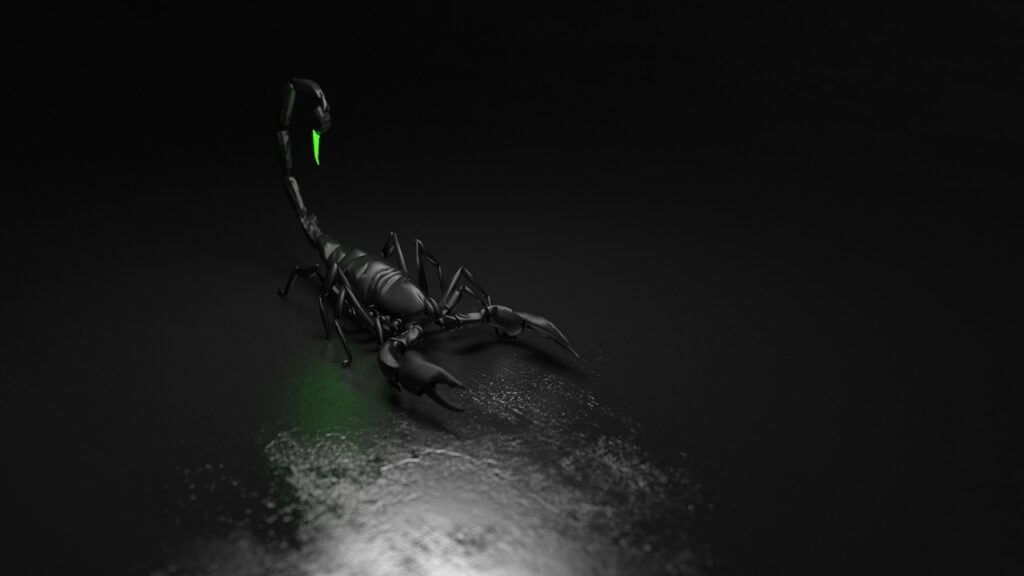Are scorpions Poisonous or Venomous? What’s the difference?
Scorpions are Venomous and not Poisonous
Yes, scorpions are venomous and not poisonous. It’s because they have two venom glands connected to a stinger at the tip of their 5 segmented tail with which they pierce their victim or prey to ingest its venom.
Scorpions are not poisonous because they don’t have any such glands that can secrete poison through their body or skin surface.
And, they also can’t unload their toxins when they are ingested by predators. They only have their venomous stinger for self-defense.
The term venomous and poisonous looks pretty much the same thing, but are technically different. And so, people often confuse these two different terms venomous and poisonous together.
The majority of the people will say wrongly, “Scorpions are poisonous.” On the other hand, those that have understood these two terms properly will correctly say, “Scorpions are venomous.”
Let it be a venomous or a poisonous animal, both will secrete and use toxins as their chemical weaponry to protect themselves, or kill, destroy, feed, and digest their prey.
It’s easy to differentiate, as poisonous animals don’t bite to insert the toxins into the body of the prey. Whereas, Venomous animals bite using their fangs, or stinger like the scorpion to insert the toxin into the body of the prey.
So, it is always correct to term Scorpions as venomous.
Each species has its own unique nature of venom with different levels of toxicities. This makes some of the species lethal and some non-lethal at all.
The deadly scorpion’s venom can cause a massive release of neurotransmitters causing excessive sweating, nausea, vomiting, hypersalivation, restlessness, and in more severe cases, arrhythmia, unconsciousness, and heart failure, thus leading to death.
Also, not all scorpions are venomous. A majority of the scorpions are non-venomous and mild-venomous.
It has been estimated that only about 25 out of the 2,000 known species of Scorpion have fatal venom that is capable of killing a healthy adult human. For example, Tityus serrulatus, Buthotus tamulus, Leiurus quinquestriatus, etc.

What is actually a Scorpion sting? How serious is the scorpion sting?
Scorpion stings are the cutaneous and painful conditions caused due to the stinging of the scorpions.
The scorpions can pierce their victim or prey with the venomous stinger in their tail. And, the conditions occurring after stinging the victim using the stinger is termed as the Scorpion sting.
The scorpion sting can be sometimes deadly to adults, but children, the elderly, and immunocompromised people are mostly at risk.
After the sting, most probably the pierced body part of the victim will form swelling to medically significant lesions along with an extreme level of pain.
Some venomous to mild-venomous species are also able to cause severe allergic, neurotic, or necrotic reactions in the victim’s body when they sting.
The sting releases neurotoxic venom into the body of the victim. The toxic effects of the venom can include the extreme increase of high body temperatures, respiratory paralysis, very low or very high blood pressure, and a rapid heartbeat (tachycardia).
Scorpion’s neurotoxic venom contains chlorotoxin that inhibits and blocks the Chloride channels. Thus, due to this, the muscle cells are not able to detect when to relax or contract periodically, and as a result paralysis happens.
Another possible complication of scorpion stings, though rare, is a severe allergic reaction called anaphylaxis. During anaphylaxis, signs and symptoms may include a rapid and weak pulse; a skin rash; and nausea, and vomiting.
Is there such a thing as a poisonous scorpion?
No, there are no such scorpions on earth that are poisonous. Meaning that all scorpions are venomous, that is they have a stinger to sting their victim.
They don’t secrete toxins from their skin surface when ingested, but do ingest the toxin when they sting. So, there’s no such thing as a poisonous scorpion.
Yes, not all scorpions are fatal. They have a sting comparable to that of a bee sting, but a few scorpion species have a venomous sting that can be lethal to humans.
Remember, the smaller the scorpion the venomous it is. And also, the scorpions with thin and smaller claws (grasping pedipalps) are more venomous than the scorpions with thick, chunkier, and large claws.
And if a scorpion has a thick and large tail then it will contain a fatal neurotoxic venom in its sting. Whereas, those with thin and small tails aren’t so venomous or mild venomous.
Venomous scorpions carry toxins in their venom glands with ducts flowing out through the telson of their stinger and coming outside. Whereas, poisonous animals carry toxins in their skin glands and no such evidence of such poisonous skin glands has been seen in any of the scorpion species so far.
According to biologists, the term venomous is applied to those organisms that bite (or sting) to inject their toxins, whereas the term poisonous is applied to those organisms that unload toxins when you eat them or touch them. These also show that scorpions are not poisonous but venomous.
Do scorpions die after stinging and breaking off their tail?
The majority of the Scorpions don’t die after stinging. It’s because they can keep their tail and stinger alike and safe as it was before after stinging their victim.
Whereas, some species like the 14 species of Ananteris scorpions in the northern jungles of South America have been reported to die within 7-8 months after they have stung a victim and have lost their tail portion.
When the bee stings, it can’t pull the stinger back out. It leaves behind not only the stinger but also part of its digestive tract, muscles, and nerves. This massive abdominal rupture is what kills the bee.
Same as the bees, the 14 species of Ananteris scorpions can also run from their predators by breaking and leaving off their tail portion and the stinger. They break off their tails to avoid capture.
As they break off their tail region, they not only lose their ability to poop but also their ability to further sting.
Although their stumps get healed within a few days, but their tail portion which contains the anus and part of the digestive system won’t grow again.
Now their abdomens will swell and keep the excretory wastes in it for the next 7-8 months until it dies, as it has now lost the ability to poop.
It has been also reported that after the removal of the tail portion the scorpion will be able to live for the next 7-8 months hardly. And during the rest of life, they could still hunt small prey and mate successfully.
It has been also seen that the male scorpions were much more likely to snap off their tails than the females.
Can a dead scorpion still sting you?
Scorpions can’t knowingly sting you after it’s dead. But, it’s tail can contain that neurotoxin venom even after its completely dead.
Don’t consider a scorpion like that of any other insect. The first thing you need to make sure is that they don’t die so easily, and if you think you have killed it, then it may be still alive.
Scorpions are not like ordinary insects. And, if they have a 1% life left behind then they can still be able to sting you. They will only stop stinging after they are completely dead.
So, you will often find people saying that these creatures are difficult to kill and can sting even after dying.
It is not advised to kill them. Take them away from your area and let them lead their live.
But still, if you want to kill them to just get rid of these venomous creatures, then it’s better to first hold them using a long stick and then cut way their tail portion. Then crush the body (head and abdomen) with a stone or a heavy thing to kill it.
Next, remember that the tail will still have the venom stored in it. So, it is advised that you don’t crush the tail.
Better dig a burrow in the soil and put the crushed body (head and abdomen portion) along with the uncrushed tail in that burrow and cover it with soil.
In this way, the venom won’t come in contact with any other living creature and will be decomposed in the soil.
How venomous are Scorpions?
Scorpions do have a neurotoxic type of venom. Neurotoxic venom is a chemical toxin that affects the nervous system, ultimately killing or paralyzing the victim. Their neurotoxins can also cause symptoms such as convulsions and shortness of breath.
